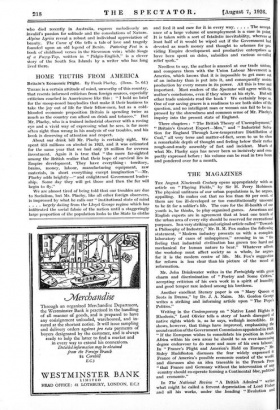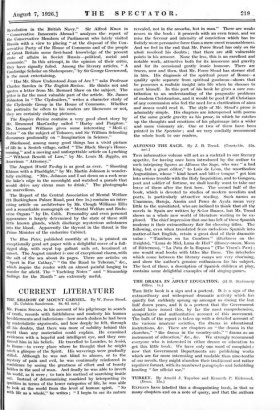THE MAGAZINES
THE August Nineteenth Century opens appropriately with an article on " Playing Fields," by Sir H. Perry Robinson. The physical unfitness of our urban populations is, he argues, appalling. He makes out that no less than 80 per cent. of them are too ill-developed or too constitutionally unsound to be fit for a soldier's life. The cure for the ill-health of our youth is, he thinks, to play organized games. American and English experts are in agreement that at least one tenth of the urban area of every city should be reserved for recreational purposes. In a very striking and original article called " Towards a Philosophy of Industry," Mr. R. M. Fox makes the following statement, " Modern industry presents us with a complete laboratory of cases of unhappiness," arousing in us " the feeling that industrial civilization has grown too hard and mechanical for human nature to bear." Whatever affects the workshop must affect society as a whole, he argues, for it is the modem centre of life. Mr. Fox's suggestion for reform is less clear than his picture of the need of reformation.
Mr. John Drinkwater writes in the Fortnightly with great charm and discrimination of " Poetry and Some Critics," accepting criticism of his own work in a spirit of humility and good temper rare indeed among his brethren.
Another excellent literary paper is on " Mary Queen of Scots in Drama," by Dr. J. A. Nairn. Mr. Gordon George writes a striking and informing article upon " The Pope's Politics."
Writing in the Contemporary on " Native Land Rights is Rhodesia," Lord Olivier tells a story of harsh disregard of native rights which is, as he says, wellnigh incredible. lie shows, however, that things have improved, emphasizing the sound caution of the Government Commission appointed in 1924. " If the European wishes to consolidate his position in South Africa within his own areas he should to an ever-increasing degree endeavour to do more and more of his own labour." In " France's Plight and America's Hold on Europe," Mr. Sisley Huddleston discusses the fear widely expressed is France of America's possible economic control of the workL and discusses also an idea traceable in the French Free " that France and Germany without the intervention of any country should co-operate forming a Continental bloc, political and economic."
In The National Review " A British Admiral " writes what might be called a fervent depreciation of Lord Fisher and all his works, under the heading " Evolution and
Revolution in the British. Navy." Sir Alfred Knox in " Conservative Innocents Abroad " analyses the report of the Conservative Members of Parliament who lately visited Russia with a view to placing " at the disposal of the Con- servative Party of the House of Commons and of the people of Great Britain some first-hand knowledge of the present state of affairs in Soviet Russia—political, social and economic." In this attempt, in the opinion of their critic, they have signally failed. Among the literary articles, " A Cambridge Scholar on Shakespeare," by Sir George Greenwood, is the most entertaining.
" Has Mr. Shaw Understood Joan of Arc ? " asks Professor Charles Sarolea in The English Review. He thinks not and quotes a letter from Mr. Bernard Shaw on the subject. The letter is far the most valuable part of the article. Mr. James Johnston in " The Clydesiders," writes a character study of the Clydeside Group in the House of Commons. Whether the portraits he offers to his readers are likenesses or not, they are certainly striking pictures.
The Empire Review contains a very good short story by Mr. Desmond MacCarthy called " Harby and Pargiton." Dr. Leonard Williams gives some interesting " Medi. Notes " on the subject of Tobacco, and Sir William Schooling discourses profoundly on " Imagination in Science."
Blackwood, among many good things has a vivid picture of life in a Scotch village, called " The Black Sheep's Home- coming," and a moving and unforgettable article on Lynching —" Without Benefit of Law," by Mr. Louis M. Jiggits, an American " Attorney."
The August World To-day is as good as ever. " Shooting Rhinos with a Flashlight," by Mr. Martin Johnson is wonder- fully exciting. " Mrs. Johnson and I sat down on a rock near the lake's edge in the moonlight and watched a parade that would drive any circus man to drink." The photographs are marvellous.
The Report of the Central Association of Mental Welfare (24 Buckingham Palace Road, post free ls.) contains an inter- esting article on architecture by Mr. Clough Williams Ellis and a remarkable monograph on " Mental Welfare and Endo- crine Organs " by Dr. Cobb. Personality and even personal appearance is largely determined by the state of these still little known glands, which discharge mysterious substances into the blood. Apparently the thyroid in the throat is the Prime Minister of the endocrine Cabinet.
The Blue Peter, published monthly at ls., is printed on exceptionally good art paper with a delightful cover of a full- rigged ship, with royal top gallant sails set, becalmed at sunset. The August number is one of exceptional charm, with the salt of the sea about its pages. There are articles on " Sport in Far Cathay," " On the Road to Teheran," &c., which inspire the reader with an almost painful longing to wander far afield. The " Yachting Notes " and " Steamship Sailings for the Month " are extremely useful.







































 Previous page
Previous page